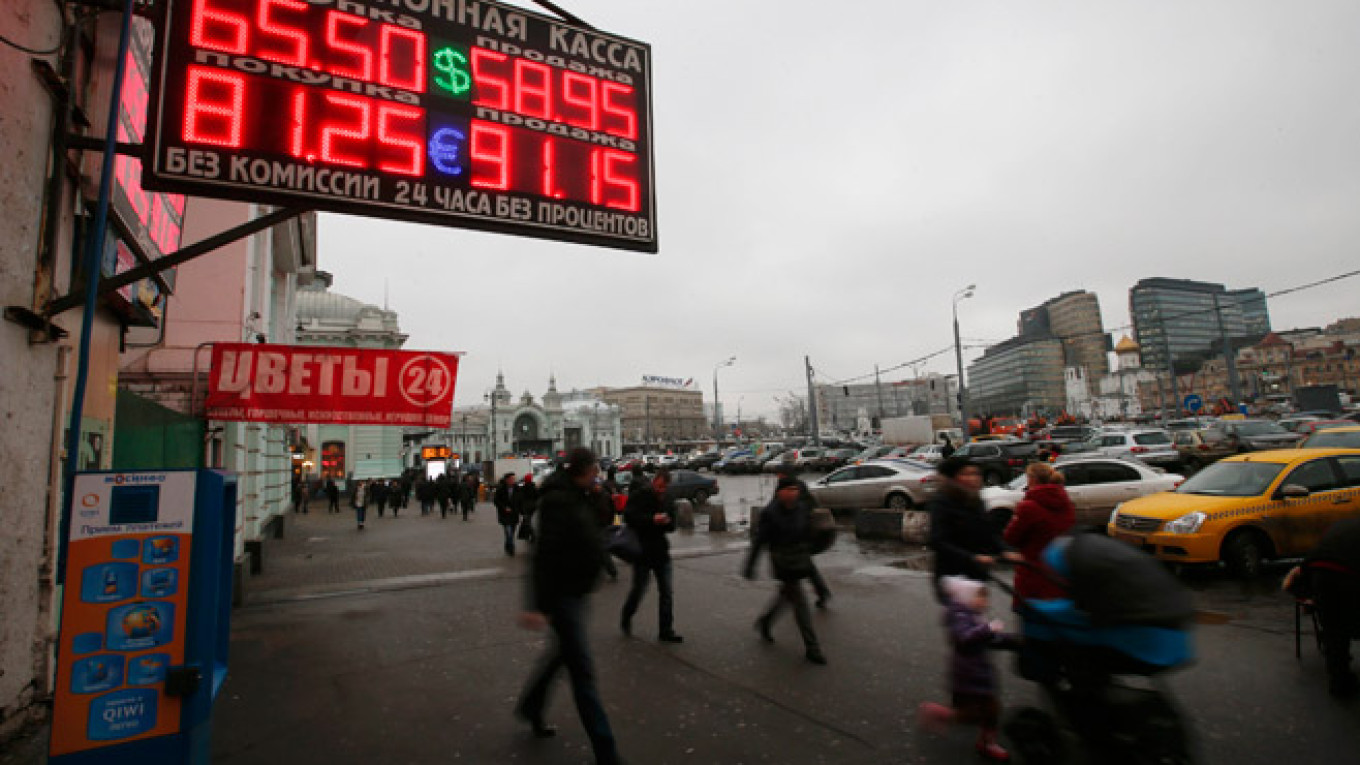Russia's ruble strengthened sharply on Wednesday after dramatic falls on the previous two days as the government pressured exporters not to hoard foreign-currency earnings and the Central Bank announced new measures to support financial stability.
The ruble was around 9 percent firmer against the dollar in volatile trading, with the market also boosted by Central Bank plans to ease concerns over approaching external debt repayments by Russian firms and stabilize the ruble.
Traders also saw targeted sales of foreign currency by exporters, in part because of upcoming monthly tax payments.
At 6:30 p.m. Moscow time the ruble was up 9 percent at 61.50 rubles per dollar on the Moscow Exchange and was around 10 percent stronger versus the euro at 76.55.
The ruble has come under heavy selling pressure this week, falling around 20 percent against the dollar at one stage on Tuesday, sparking fears of financial meltdown, despite the Central Bank hiking its key interest rate by 6.5 percent.
The situation poses a major challenge for President Vladimir Putin whose popularity, based partly on providing stability and prosperity, is at risk from a ruble decline that is damaging Russia's credibility among investors.
"Sooner or later they'll flood the market with foreign currency, that's what the market expects. We're awaiting foreign currency from exporters, the finance ministry and Central Bank," said Igor Akinshin, a forex trader at Alfa Bank in Moscow.
Prime Minister Dmitry Medvedev called on Russia's top exporters on Wednesday to behave "responsibly" with their forex revenues after meeting with the heads of state exporters including Gazprom and Rosneft.
The Finance Ministry, meanwhile, said it had started selling foreign currency left over on its accounts.
Analysts say the ruble's slide has meant exporters have held on to as much of their forex earnings as possible.
The slide was deepened early this week by concerns Russian oil major Rosneft, which recently issued 625 billion rubles ($10.11 billion) in bonds, was converting the money it had raised into foreign currency to meet debt repayments.
Rosneft has denied the money would be used to buy dollars and is expected to repay a $7.6 billion portion of a bridge loan that matures on Sunday.
Putin holds his annual end-of-year news conference on Thursday, when he will field questions from a studio audience and television viewers around Russia, and is expected to comment on the ruble's decline of about 45 percent this year.
Putin failed in a state of the nation address on Dec. 4 to offer any big ideas to turn around the economy — which is sliding toward recession after being hit by Western sanctions over the Ukraine crisis and by a fall in the global price of oil, on which the Russian economy is heavily dependent.
The ruble's slide has stirred memories of the 1998 Russian financial crisis, when the currency collapsed within days.
"What we're seeing now is the result of choosing the wrong time to float the ruble," analysts at Bank Zenit in Moscow said in a note, following the central bank's decision last month to float the currency.
Two traders said they did not believe the Central Bank was intervening heavily in the market on Wednesday, and a currency dealer at a large Russian bank said he believed exporters were having their arms twisted to sell their foreign-currency earnings.
Russia's Central Bank has conducted over $80 billion in forex market interventions this year to defend the ruble.
Dollar-denominated Russian shares were helped by the stronger ruble, with the RTS index up over 17 percent to 738 points after steep losses in the past two sessions.
The ruble-denominated MICEX, however, was hurt, falling 1 percent to 1,427 points.
A Message from The Moscow Times:
Dear readers,
We are facing unprecedented challenges. Russia's Prosecutor General's Office has designated The Moscow Times as an "undesirable" organization, criminalizing our work and putting our staff at risk of prosecution. This follows our earlier unjust labeling as a "foreign agent."
These actions are direct attempts to silence independent journalism in Russia. The authorities claim our work "discredits the decisions of the Russian leadership." We see things differently: we strive to provide accurate, unbiased reporting on Russia.
We, the journalists of The Moscow Times, refuse to be silenced. But to continue our work, we need your help.
Your support, no matter how small, makes a world of difference. If you can, please support us monthly starting from just $2. It's quick to set up, and every contribution makes a significant impact.
By supporting The Moscow Times, you're defending open, independent journalism in the face of repression. Thank you for standing with us.
Remind me later.


